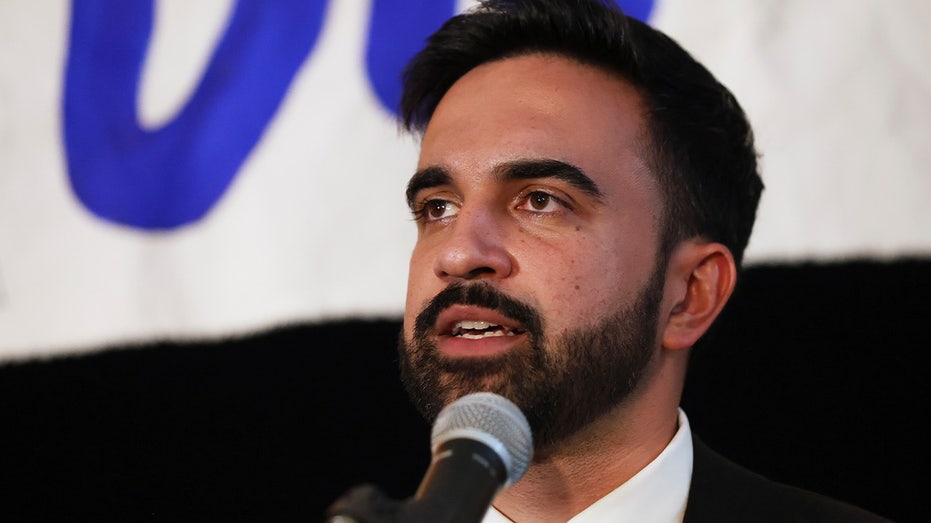The tremor in Zohran Mamdani’s voice was barely perceptible, yet it resonated with a deep, personal history. Speaking outside a Bronx mosque, the mayoral candidate recalled his aunt’s fear after 9/11 – a fear that forced her off the subway. This wasn’t just a campaign stop; it was a glimpse into a lived experience that fueled his candidacy, and a signal of the forces aligning behind him.
Standing behind him was Debbie Almontaser, a name etched in the memory of Muslim American activists. Nearly two decades prior, she was ousted as a school principal after defending a simple T-shirt slogan. Viewed as inflammatory by city officials, she maintained it was a message of peace. Her case became a symbol of perceived injustice, a rallying cry against what many saw as rising Islamophobia.
Now, Almontaser was a key advisor, part of a network of over 110 groups actively supporting Mamdani, alleging similar bias against him. When questions arose about his connections to a controversial Brooklyn imam, she swiftly mobilized a defense, revealing a coordinated operation aimed at propelling him into office.
Mamdani’s own background offers a nuanced perspective. He identifies as a Khoja Shia Muslim, a relatively liberal sect with Indian roots. However, many of his most vocal allies adhere to stricter Sunni interpretations of Islam. Their common ground isn’t theological, but political – a powerful fusion of faith, identity, and ambition.
“This is how political Islam adapts inside democracy,” explains a Washington-based researcher specializing in Muslim political movements. What was once focused on community services is now a sophisticated machine mobilizing voters and cultivating candidates, reshaping the political landscape.
At the heart of this effort is a core group of roughly a dozen individuals, adept at framing any criticism as an attack on their faith. They readily accuse opponents of Islamophobia, even while expressing strong opinions against the United States, Israel, and the prevailing economic system.
The controversy ignited when Mamdani publicly aligned himself with Imam Siraj Wahhaj, a figure with a decades-long history of provocative statements. In 1992, Wahhaj suggested American Muslims should seek an “emir” instead of choosing between presidential candidates. He later served as a character witness for the “Blind Sheikh,” convicted in the 1993 World Trade Center bombing.
Wahhaj’s rhetoric has been consistently harsh. He once described America as “filthy and sick.” More recently, his family was linked to a disturbing case in New Mexico involving malnourished children and a fatal attempted exorcism, a situation he dismissed with a troubling lack of concern.
Another key figure, Mohammad Badawi, a youth director within the Muslim American Society, openly calls for victory for Muslims “worldwide,” envisioning it achieved “after the destruction of the illegitimate Zionist occupiers.” He actively organizes protests, urging young people to “fight back” against perceived injustices “by any means necessary.”
These protests, often led by Abdullah Akl, are framed as “sacred activism,” a blend of faith and resistance aimed at “freeing Palestine.” Since the October 7th attacks, they’ve escalated, with chants echoing calls for “intifada revolution” even within the New York City subway system.
When Akl and other activists were arrested, the Council on American-Islamic Relations (CAIR) immediately demanded their release. CAIR, a long-standing advocate for Muslim rights, has also faced scrutiny, having been named an unindicted co-conspirator in a terrorism-financing case.
Mamdani himself once recorded rap lyrics referencing those convicted in that case, the “Holy Land Five,” demonstrating a complex and potentially troubling connection to controversial figures. This history is now being re-examined as his mayoral bid gains momentum.
Adding another layer to the network is Basim Elkarra, who envisions a new era of political influence for American Muslims, directly challenging the long-held dominance of pro-Israel lobbying groups like AIPAC. He declared, “AIPAC had its run for 60 years, but it is over now.”
Mehdi Hasan, a prominent media figure, has become a vocal defender of Mamdani, framing criticism as bigotry and portraying the candidate as a uniquely talented political force. However, Hasan’s own past statements, including comparisons of non-Muslims to “animals,” have drawn scrutiny.
Influential Imam Yasir Qadhi has publicly endorsed Mamdani’s candidacy as a “civilizational victory,” urging Muslims to overlook social progressiveness in favor of political alignment. Yet, Qadhi has a history of making disparaging remarks about Jewish people and promoting controversial interpretations of Islamic history.
Imam Khalid Latif, a popular chaplain, has also thrown his weight behind Mamdani, calling him “a bearer of compassion.” His past includes leading a pilgrimage that included Omar Mateen, the perpetrator of the Pulse nightclub shooting, raising questions about his judgment and associations.
Linda Sarsour, a well-known political organizer, has been a mentor to Mamdani, inviting him into the Muslim Democratic Club of New York and endorsing his previous campaigns. She is a polarizing figure herself, known for inflammatory rhetoric and accusations of antisemitism.
As the campaign reaches its climax, a researcher warns that this network is amplifying a narrative of grievance, potentially at the expense of Muslim pluralism. “They insist that to oppose them is to betray the community,” he says, “so they actually push their own tyranny.”
Whether Mamdani wins or loses, the “God Squad” has already achieved a significant outcome: a resurgence of the slogan that once brought Debbie Almontaser so much trouble. The echoes of “Intifada NYC” are once again reverberating through the city’s streets, signaling a profound shift in the dynamics of New York politics.






